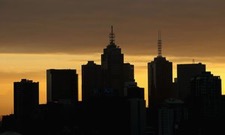Tuesday, 03/03/2026 | 19:13 GMT+7
The project, which would create a guaranteed market for renewable energy, aims to reduce city’s annual emissions by 138,000 tonnes a year
Councillor Arron Wood, the city of Melbourne’s environment portfolio chairman, does not hold back when discussing how cities can lead from the front in tackling climate change.

The Melbourne renewable energy project, conceived and managed by the city council, has been two years in the making. Thirteen major institutions operating in the city have formed a consortium that will sign an agreement to purchase a large chunk of their electricity from a new large-scale renewable energy project.
The consortium members are the city of Melbourne, Australia Post, National Australia Bank, the University of Melbourne, RMIT, data centre operator NEXTDC, Zoos Victoria, the city of Port Phillip, Moreland city council, the city of Yarra, Citywide, Melbourne convention and exhibition centre and Bank Australia. If the project goes ahead, it will reduce Melbourne’s carbon emissions by 138,000 tonnes per year.
The strategy will give a would-be project the chance to secure a buyer for the electricity it would produce but it also overcomes the reality that none of those 13 organisations would be big enough on their own to sign such a large-scale energy agreement.
A tender process is underway to find a proponent to provide 110GWh of renewable energy each year, enough to power 28,000 homes. The tender deadline is 20 June and, as the process is confidential, the council has not revealed which energy companies have submitted proposals.
The strategy is revolutionary, as it is the first time in Australia that a group of buyers has joined forces to purchase large-scale renewable energy. In fact, the council says it is not aware of a similar model anywhere in the world, especially under the leadership of a city council.
“We don’t often talk about government being the innovators but this is a really innovative project driven by the city of Melbourne,” Wood says.
Global interest in the Melbourne project mainly comes from C40 Cities Climate Leadership group, an international group of 75 “megacities” from six continents, including London, Paris, Beijing, Shanghai and New York, which exchange knowledge and ideas to combat climate change.
C40’s interest was underlined by a visit to Melbourne from the group’s London-based executive director, Mark Watts, in March to examine the council’s strategies to become a low-carbon city.
Watts described the consortium model as “a fantastic initiative” that reflected the need for innovative solutions.
“By partnering with other major energy users in the [city] from the University of Melbourne to Bank of Australia to the city zoo, they have created a guaranteed market for renewable energy that makes a renewable plant look like a great investment for energy companies,” Watts says.
Watts believes the Melbourne model could be exactly what other cites around the world need, particularly as most cities, including Melbourne, have no direct control over electricity generation.
The council has set itself a target to source 25% of the municipality’s energy from renewables by 2018. Right now, that figure sits at 12% and Wood says, even with the 110GWh project, a lot more will need to be done to reach the target. The project is the biggest step so far in the city of Melbourne’s overall wide-ranging efforts to mitigate climate change, including partnering with businesses to make buildings more sustainable and working to replace the city’s streetlights with LED lighting.
Theguardian.com







